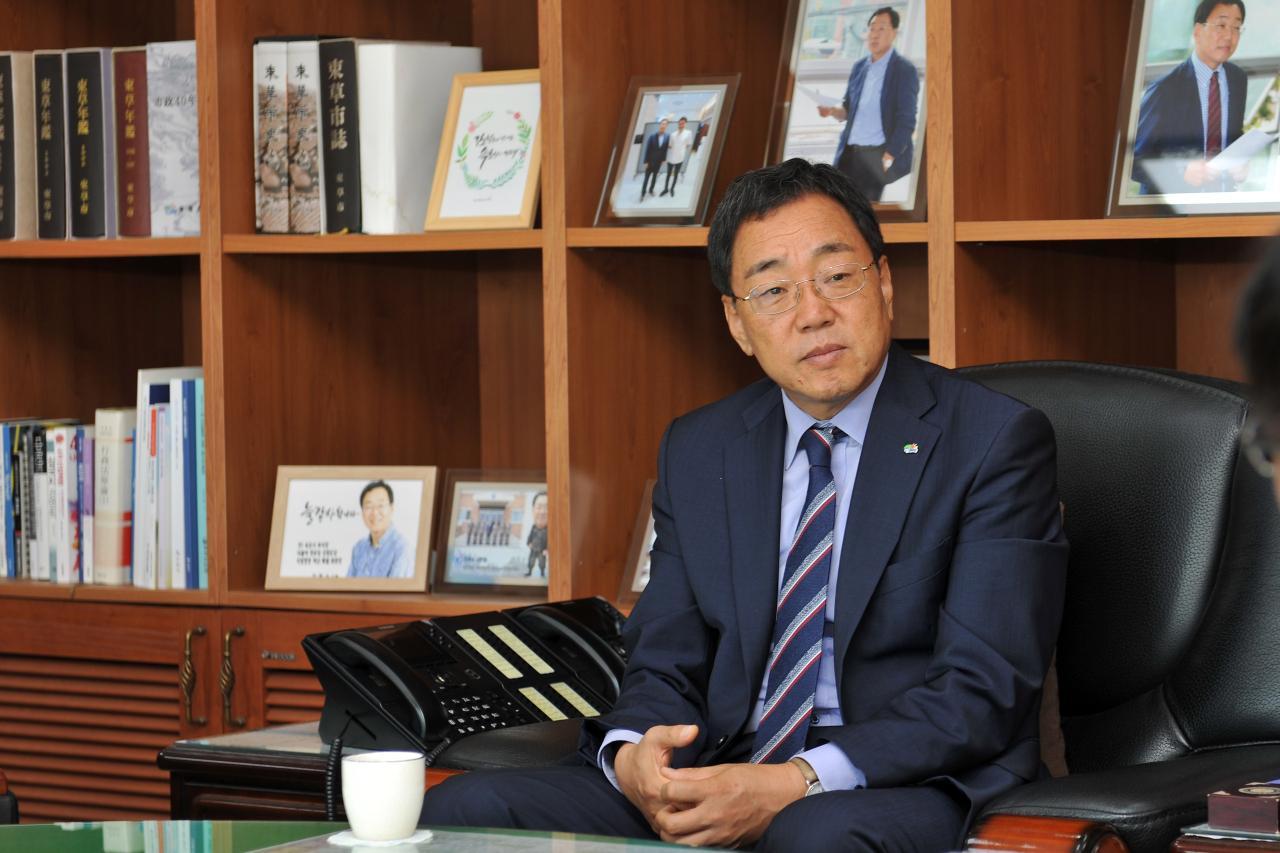Sokcho Mayor Kim Chul-soo is a self-made man who started off as a grade 9 civil servant and was elected as Sokcho deputy mayor, to reach where he is today. Not everyone in the civil service can dream of achieving what he has.
Kim’s perseverance earned him the nickname “chariot on fire.” The name proved to suit him well as he declared a “war against water shortage,” the city’s long-existed problem, and successfully resolved it as soon as he was elected in 2018.
Water shortage has always been a problem in Sokcho, but the case worsened due to the mismanagement of policies in the past, making citizens turn their backs on city officials. This is one of the main reasons behind Kim’s victory in the 2018 local election. He calculated the exact amount of water that needed to be supplied and presented numerous ideas to make it happen.
Mayor Kim’s solutions were on point. Former officials lacked the knowledge to resolve the issue and they were also preoccupied with apartment constructions. Up to 13,000 tons of water per day was lacking back in 2018, when drinking water shortage worsened day by day, eventually leading to restrictive water rationing.
In contrast, Mayor Kim promised to retain 15,700 tons next year and 20,700 tons by 2022. So far, he has been successful with keeping this promise.
He paid close attention to the opinions of Sokcho residents instead of engaging in conflict. He avoided making ill-considerate decisions as previous mayors had done. As a result, the population of Sokcho at the end of 2018 recorded 37,993 households with 80,682 people, which is down by 591 compared with 2017. Meanwhile, the housing supply ratio is predicted to steadily increase from 112 percent in 2018 to 130 percent in 2022, if everything is carried out as planned.
“The rapid increase of prices for newly constructed apartments and land made our people lose hope of buying their own homes. It only benefited real estate companies from outside,” Kim said.
He has not approved any license so far as mayor.
“The development boom in Sokcho is even compared with Gangnam (the posh district in Seoul) these days. Sokcho only has 38 square kilometers available for development, excluding the 63 percent (67 square kilometers) of national park area. This scarce land had been thoughtlessly wasted with high-rise apartments and living facilities, but without a single construction of convention centers or tourist attractions since 2016,” he added.
Large-scale constructions did not help the city’s economy at all. It collected only 8.2 billion won in taxes linked to the construction boom over the past five years, which is a tiny sum considering the huge suffering of people living in Sokcho.
“Better late than never, last year, we made revisions to the urban planning ordinance as a means to prevent reckless development and protect the environment,” Kim said.
The mayor claimed that Sokcho is fundamentally different from other famous spots such as Haeundae in Busan or Songdo, Incheon.
“Some may cite the development examples of other cities and regions, asking for deregulations that would pave the way for the construction of high-rise apartment complexes. This is a short-sighted comparison,” he said.
What he means is that it is okay for places like Busan and Songdo to build high apartments because they have already attracted a great number of people with large-scale tourist attractions, convention centers and manufacturing facilities, but that is not the case for Sokcho.
Mayor Kim portrayed his vision for the future saying, “We should no longer let outside factors destroy the beautiful nature that is given to us. Also, our residents should never have to deal with such issues for whatsoever reason from now on.”
“This city we are living in is not ours, but belongs the future generations. We may be late, but we are still responsible for passing down a well-preserved, nature-friendly city, not a forest of buildings,” Kim said.
Now that Kim has taken related measures, new constructions for residential purposes are limited to 25-stories-high and under. Along with the limitation of height, floor space ratio was also lowered from 900 percent to 700 percent to prevent overcrowded development in general commercial area.
Kim emphasized the importance of teamwork to work out policy issues for Sokcho.
“Now, we are all on the same boat. As your captain, I will put all my efforts into setting a good example for everyone. We can do this together,” he said.
By Park Joung-kyu (
fob140@heraldcorp.com) & Kim Tae-eun (
kimt17@heraldcorp.com)








